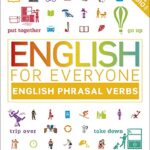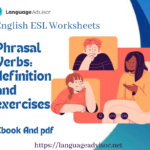Phrasal verbs and idiomatic expressions. English grammar with exercises. Free eBook and Free printable PDF.
Phrasal verbs and idiomatic expressions

Phrasal verbs and idiomatic expressions
Phrasal verbs are two or more words that together act as a completely new word, with a meaning separate from the original words. For example, pick up means to “grab” or “lift,” very different from the definitions of pick and up alone. Popular in spoken English, phrasal verbs can be quite confusing because their definitions aren’t always easy to guess—and there are thousands of them. In fact, many phrasal verbs are distinct variations on the same base verb, which can add to the confusion.
What is a phrasal verb?
A phrasal verb combines a normal verb with an adverb or a preposition to create an entirely new verbal phrase—the phrasal verb. The meaning of a phrasal verb is usually unrelated to the meanings of the words that comprise it, so think of a phrasal verb as an entirely new and independent word.

Exercises
Phrasal verbs and idiomatic expressions
EXERCISE 1.
Using the following phrasal verbs and idiomatic expressions, complete the sentences.
to be on to sth – to be worked up – to pop over – to keep on doing sth – to tip sb off – to come down to it – to come on – to break up – to get through to ups and downs of sth – to settle on up and about – to be up against sth up and down – to crack up – to make up – to speak up
- ____________ please! I can’t hear what you are saying.
- Why don’t you __________ and see me later. I’ll be at home after 5 pm.
- We ___________ the house in the country. It was a hard decision though.
- Yvonne has been _____________ lately since her marriage broke up.
- I’ve got so much work to do at the moment that if I don’t take a holiday, I _____________.
- The detective ___________ to the case since January. It won’t be long before he knows who was responsible.
- The teacher ___________ lots of new activities before she left. She had a lot of imagination.
- David __________ the police ________ about the drugs deal which was taking place that evening.
- Don’t get yourself so ___________ about the interview – you’ll be fine.
- How _________ the message ___________ to you so quickly? I only sent it a few hours ago.
- He _______________ asking and asking until his mother eventually said yes.
- Have you heard the news? George and Belinda ____________ . George has a new girlfriend now. Belinda is distraught.
- I hate going into work because my boss ______________ to me. He is always sending me messages and phoning me and telling me how beautiful I look.
- When it ___________ , she hasn’t got a leg to stand on.
- There will always be _________ and ___________ of everything. You have to learn to cope with good and bad situations.
- Don’t worry! After the operation, you will be ________and ___________ in no time. Wait and see!!
- I _____________ a real hard case this time. I don’t think it will be easy to solve.
EXERCISE 2.
Fill in the spaces with the phrases below and put them in the correct tense.
to take a shine to – to put your finger on – to look through –
to look forward to – to knock down – to fail to come through
e.g. She seems to have fallen apart after her break up with her boyfriend.
- Would you take a look at that! Henry really seems to have _____________________________ that bimbo. Look! He is even holding her hand.
- I can’t __________________________ it but I think it may have something to do with the drive-shaft. If I were you, I wouldn’t drive another inch.
- After the bombing of Dresden during the Second World War, almost all the buildings left standing had ________________________ .
- It has been such a long time since we had the opportunity to go anywhere. I’m really ___________________________ to our holiday in July.
- It’s very unfortunate that you will have to ______________________your company _____________________ to that son of yours. How long do you think the business will last under that idiot’s management?
- I ____________________________ my father’s papers after his death and came across these old photos taken during the war.
- This old dress is all tattered and torn. It’s literally ___________________________________________ .
- He was very upset when the offer to buy his firm _____________________ .
EXERCISE 3.
Put the correct word in the gaps below:
denied – to get a grip – old-fashioned – steer clear of
e.g. What are you so nervous and jumpy about.
Everything will be fine.
- Despite keeping up his perfect record of good behaviour, the prisoner was _______________ early release due to the seriousness of his crime.
- “Private Jones, if you don’t _____________________ of yourself now, I’ll shoot you myself before you get us all killed.
- Irene definitely has an ______________________ way about her. She wears clothes I used to see my grandmother wear and she doesn’t seem to keep any modern equipment in that cottage of hers. She hasn’t even got a fridge.
- I have told you several times to ___________________ that rascal down the street, but you just wouldn’t listen. I hope you have learnt your lesson now.
- Roger had never been so _______________________ in his life as on the day of his wedding. It was a big enough ordeal for him as it was, without his crazy ex-girlfriend turning up at the church. She then proceeded to burst into tears in front of his bride.
- Don’t be so ________________________ ! We’ll be in and out of the building in less than five minutes. The police won’t have any chance of catching us.
- Henry hadn’t put any effort into his job over the last three years, yet when he was told he had been _________________ he expressed an amazing sense of Surprise and anger. He confronted his boss with a look that suggested “how dare you”!.
- Jenny’s having her birthday party next week. Why don’t we all ______________________ a nice present?
EXERCISE 4.
Put the correct expression in the sentences. You may have to make necessary changes.
look over peter out grow up go in
look through think out pay court to be sacked
e.g. Their love petered out and boredom set in.
- Don’t forget to ______________________ this exercise again before you give it to the teacher to correct.
- Some people never _________________ . They can be thirty-five years old but act like they’re fifteen!
- If we want to get the deal done, we’ll have to _____________________ to the politicians!
- Please _________________ your objectives before you start the actual work.
- The family had a lot of money but after three generations it ______________
- After thirty years in the firm, he __________________ without notice.
- The screw doesn’t fit; it ______________________ .
- I ________________________ my recipe book when I found my great- grandmother’s Christmas cake recipe.
EXERCISE 5.
Fit the words in the box below into the correct spaces in the story.
To think up -to take sth in one’s stride – to look out for someone
To hang about – to litter up – to drop by- to bump into
Martin desperately needed something to do. It had been one of those mornings where everything seemed so stale and so dead. He decided that it was about time he ____________________ a plan of action for his life, or at least for today. Without further delay he got dressed, grabbed a quick sandwich and left the house for the town centre.On route, he met the usual wasters __________________ the old mill entrance, which was their usual haunt. As he passed by, they shouted abuse at him. Martin showed his hands deeper into his pockets and tried to look like he _______________________.Unfortunately, Martin wasn’t the type of person who could deal with these situations emotionally, and he realised that without his big brother ___________________, he was no longer so brave about going into town alone. This was particularly true when he had to pass by these gans of bigger, older and much more frightening boys than he had ever imagined.He wondered how the villagers could ever allow these boys __________________ the streets all day with their scruffy appearances and their nasty attitudes.Martin changed his pace to a much faster one, and he quickly reached the centre of tow. as he was turning the corner past The Crown bar he __________________ his oldest friend . A short ugly little creature might be the best description one could give to him. Melvin was a year older than Martin, but he looked several years younger. Melvin always spoke with a fast broken accent: “I’ve been looking for you everywhere. Martin, I have a very important proposal to _____________________ “. Melvin’s voice grew faster and more excited as he explained his plans . It was extremely difficult , as it always was , for Martin to understand his friend , but he did get general gist . Melvin wanted to get some funds together in order ______________ his own little business venture. He wanted Martin _________________________ so he could show him his plans. Martin dropped his hands back into his pockets and turned around in the direction of his home. Melvin heard him mutter something about maybe __________________ later.

BROWSE THE EBOOK ONLINE OR DOWNLOAD THE PDF FOR FREE

All downloads are in PDF format






Where can i see answers?
Some resources have answers. Some will come. Subscribe to our newsletter to keep updated.